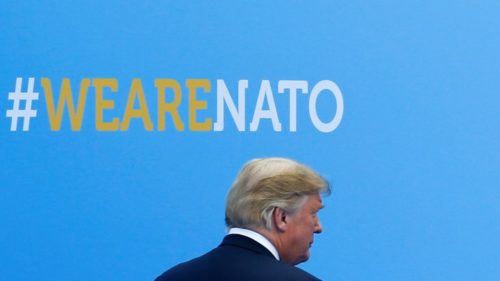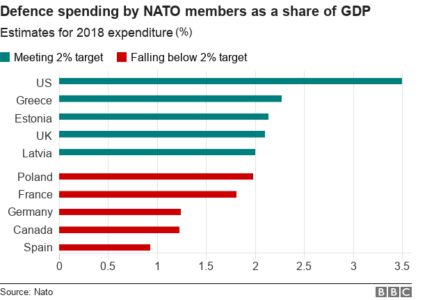The Unstable Stability
On the NATO Summit

Source: Reuters
What to say after an intense week of politics and football? While the English team failed to achieve their 52-year old dream of winning the World Cup, some dreamers of other sorts took the stages to discuss international politics and security. The arrival of US President Donald Trump, a highly controversial figure per se, guaranteed that things on the annual summit of NATO allies will be very interesting. President Trump announced that he will be demanding that every NATO member starts spending 2 % of their GDP on defence, whether they like it or not, and that the other allies owe money to the US for many years of spending on their protection.
As everyone would have probably expected, things in the NATO discussions did not go very smoothly from the start. European Council President Donald Tusk made it clear on the favourite social media tool of US President, that the EU is a reliable partner, which is spending on defence much more than Russia and as much as China. In his press statement, Tusk went even further by elaborating that US President Trump is not appreciating his allies. It was a clear fight to set to tone and the agenda of the NATO summit, and it was first class media material.

Source: BBC
It is known so far that most of the NATO members are still not very close to the 2 percent GDP defence expenditures, but obviously it is not the same case with a small member state and an economic giant. Speaking of economic giants, Germany was on the frontline of attacks by President Trump, who said that basically Germany is controlled by Russia. Trump was referring to the Nord Stream 2 pipeline deal between Germany and Russia, which is also not seen favourably among some circles in the EU as well.
Germany depends on Russian gas and the Nord Stream 2 would increase the Russian influence in Europe. President Trump did not rant against Germany as a country, but as a symbol of the European Union as a certain set of norms and political values, which is why he has a visible distaste for German Chancellor Angela Merkel. The German Government is not used to this type of behaviour, so it is still looking for ways how to address this issue.
In the end, Trump’s press conferences and conversations with journalists are truly becoming something one would like to see live. With the star of the show calling the shots, NATO’s decision to invite FYROM/North Macedonia to become a NATO member ended up being quite marginalised. When pressed with journalist questions, President Trump seems to communicate one thing, and then on Twitter he states something completely different.
Dedication of the NATO members to start spending 2 percent of GDP on defence by 2024 leaves a certain satisfaction to President Trump, who is already announcing that the long-term goal should be 4 percent. The Guardian already called the summit “two days of mayhem”, and it remains to be seen will this “mayhem” be continued on. However, there is a very long period before 2024, and by then, someone else could be sitting in The White House. At least that is what many would have liked.
